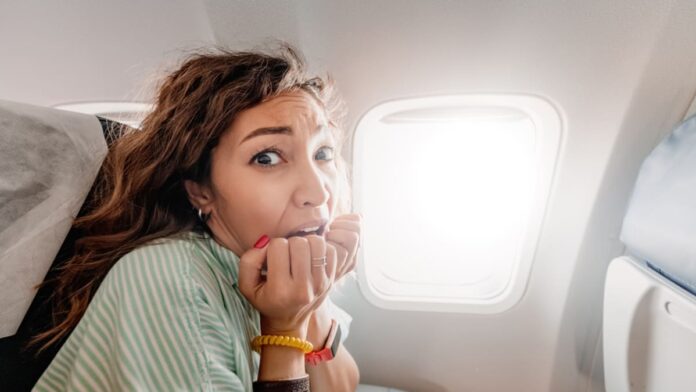Many of us struggle with a wave of fear as soon as the ‘fasten seatbelt’ sign comes on.
From the fear of turbulence to anxiety about take-off and landing, there are many potential stressors to contend with when flying. And for goodness sake, don’t watch Air Crash Investigations.
So, how can you rid yourself of flight anxiety and enjoy your journey?
James Smith from Travel Lingual delves into five tips that really work to ease flight anxiety.
Check a turbulence forecast
“While it’s common for travellers to check the weather forecast for their departure and destination cities, did you know you can also anticipate turbulence during your flight?” Mr Smith says.
“Several turbulence forecasters out there can analyse the wind and weather patterns along your flight path and provide a detailed chart of potential turbulence zones.”
This proactive approach can alleviate your anxiety by offering insights into when to expect turbulence. However, remember that these forecasts can be unreliable, particularly on longer flights.
Don’t drink caffeine
Avoid caffeine before your flight. It’s known to elevate your heart rate and potentially exacerbate your anxiety. While that nearby coffee stand might be tempting, opting out of caffeine can help keep your body at ease.
“Remember, caffeine is a stimulant that may intensify feelings of anxiety during your flight,” Mr Smith says.
“Instead, choose a soothing alternative like herbal tea, which can contribute to a calmer state of mind. By nurturing your body’s relaxation, you’ll find it easier to ease your mind as well.”
Learn what all of those sounds mean
Every ‘ding’, ‘ping’, and ‘whoosh’ on a plane can be unsettling if its origins are unknown. However, these noises are often routine and indicate the aircraft’s normal operations.
“A lot of anxious fliers have reported feeling scared when hearing a double ‘ping’ sound during take-off,” Mr Smith says.
“For most aircraft, that simply means the airplane [sic] has reached 10,000 feet, and flight attendants can start their in-flight duties.”
Similarly, various bell or chime sounds serve as communication tools for the flight staff.
Mechanical sounds, such as wing adjustments for take-off and landing, are also customary.
These mechanisms may appear louder or more alarming if you’re seated closer to specific areas of the plane. By familiarising yourself with these sounds and their meanings, you can alleviate your apprehensions and enjoy a smoother flying experience.
Talk to your flight crew
If your fear is eating you up inside, you don’t have to reply, “Good, thanks!” when a flight attendant asks you how you’re doing.
Feel free to be honest with your flight attendants about your nervousness. They are air travel experts and will give you insights to put your mind at ease.
“If you’re not in the talking mood, there are plenty of flight attendants, pilots, and other aviation specialists on online forums who can explain turbulence and other potentially scary flight factors,” Mr Smith says.
“For these folks, flying isn’t scary; it’s one of their passions. Exploring why they have this perspective can help calm you.”
Learn mindfulness techniques
Fear is ultimately irrational and may strike you during your flight, even if you’ve prepared yourself fully.
As Mr Smith explains: “It’s important to know some mindfulness techniques to set yourself at ease if you have a mid-flight panic. Try a combination of techniques in high-stress environments outside of flying first, so you know which ones work best for you.”
Here are James’ top tips:
Deep breathing
Psychologists, athletes, and yogis use breathing techniques to centre the body and ease the mind.
Many techniques exist to get your breath from panicky back down to normal. One is the 4-7-8 breathing method – this is a noted breathing technique that helps with anxiety, relaxation, and sleep.
Breathe in through your nose for four seconds, hold for seven seconds, and breathe out through your mouth for eight. Repeat up to four times.
Visualisation
Closing your eyes and painting a detailed picture in your mind can be a powerful relaxation and distraction technique.
“When I’m nervous travelling, the best visualisation is picturing myself relaxing in the destination I’m going to,” Mr Smith advises.
“It helps ground me and remind me why I’m going through the stress of travelling in the first place.”
Do you suffer from a fear of flying? What techniques do you use to overcome it? Why not share them in the comments section below?
Also read: Lost in space: What to do if your luggage goes missing

